#sarah brosenstern
Photo

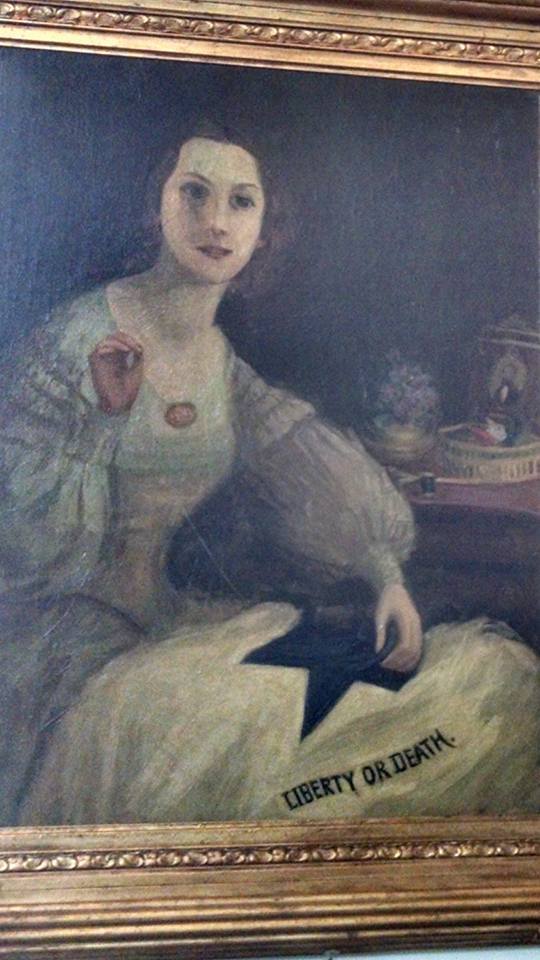
Sarah Brosenstern discusses gender, leadership, and women in the workplace.
Occasionally when I mention a professionally accomplished woman who I know, such as my doctor or my mother (a solicitor), my fiancé will say (with mock incredulity), "A woman solicitor/doctor/supervisor!!? That's impossible!"
Then he typically flails his hands, seemingly panic-stricken, and I usually laugh, sometimes forgetting what I was talking about in the first place.
But being a woman in the professional realm can be chaotic, with a barrage of social messages that come from men, other women, the media – you name it. Magazines frequently ask in wonderment "How does she do it all?" in regards to women who balance their careers, children, and domestic tasks. Or, the same publications promise that "You can have it all!" - If only you knew their secret strategy, hidden within the pages. (“Use your infant as mop!” or “Teach your Welsh Corgi how to make five-minute meals for the family!”
It is presumed that men have someone to delegate domestic duties to, or presumed that they don't have domestic obligations at all. Women still face professional discrimination over the assumption that they will leave the workforce to have children, or become too embroiled in childcare obligations to be an effective professional. Women who balance both a family and demanding professional careers often face an undeserved amount of judgement from others - in societal binaries that so often portray women in the professional realm as overly-ambitious, selfish ice queens who never have time for their sad little children…..or unfortunate little worker bees or housewives who as a result of their children, have been unable to realize their professional potential. It is exceptionally difficult for women to exist in the workplace without being forced into a particular judgmental narrative, and this absurd need to put women in labelled boxes diminishes the fact that we are just doing what everyone else does –trying to find a balance between all the things that we find fulfilling in our lives…and making sure that the bills are paid on time.
Yet women in the workplace are still seen as being somehow different. Young women entering the workforce receive a bombardment of (often unsolicited) advice on how to reconcile being a women and a professional x, as if they are somehow mutually exclusive – as if, to be competent, you have to become “one of the guys”, or at the very least, some sort of un-gendered being. During one of her first legal battles as a young solicitor, my mother was once told by the opposing side that she “needed to stop thinking like a woman and start thinking like a solicitor.” (For the record, she won the case.) Women are told to never bake anything for co-workers (“They’ll look at you like you’re their mum, forever! They’ll never take you seriously!”). Women are also told to immediately bake things if they’re new to an office (“If you’re new, it’s a great way to make friends! Everyone likes snacks, and it’s a good excuse to chat and get to know people a bit better!”) Women are told to look put-together all the time, because nothing is as terrible as an unkempt woman. Yet women are told to not be too showy, too attractive, because it will bring out the “inherent cattiness” of other women (which is supposedly something that must exist), and then they won’t be liked by the other women. This is important, because being likable is a critical component of being a woman in the workplace. And nothing diminishes a woman’s likeability quite as much as not putting up with other people’s crap behaviour. Women who do not put up with crap behaviour are undoubtedly harridans, quite possibly feminists, and definitely, absolutely, not likeable and/or fun. But again ladies, don’t be too fun, or too likable, because women who are too much of “one of the guys” are hated by other women.
This volley of gendered behaviour standards doesn’t just impact young women who are the office newbies. Women in leadership positions are constantly accused of being “bitches” or being “bossy” for behaviour that (in men) is labelled as being “direct” or “assertive.” Women who are particularly engaged in a project are seen as “emotional,” whereas men are seen as merely “passionate.” Men openly complain that offices with female leadership are just inherently more catty, more gossipy- yet I have been in plenty of environments where male leadership, (both professional and academic) has openly gossiped to their peers. Sometimes, the gossip was so profoundly negative that particular personnel, students, could not even get a “fresh start” anywhere else without a negative reputation preceding them.
This is not to say that every woman in the professional realm is a benevolent goddess. I have had negative experiences in which female leadership was unable to avoid projecting their own insecurities onto their personnel; interpreting any disagreement, any criticism, as a sign of disloyalty –and immediately alienating anyone deemed as “disloyal.” Yet I am happy to say that this was a rare occurrence in my professional life, and I was fortunate enough to be able to move to a different job. Even now, I sympathize with her paranoia – in the professional world, it’s altogether too easy for women to succumb to the pressure of all the conflicting messages about women in the workplace; to feel like there’s no way to possibly get it right and that everyone is against us, judging us, scrutinizing us.
So in the end, I will offer no advice here other than the following: Do your job, try to do it well, and stop worrying so much about the little labelled boxes.
[Sarah Brosenstern]
Sarah is an American writer on social issues in the Washington, D.C. and Baltimore, Maryland area. For more of Sarah's work, visit her website.
Read the original article on our website here: http://www.tyci.org.uk/wordpress/all-about-that-place
1 note
·
View note
Photo
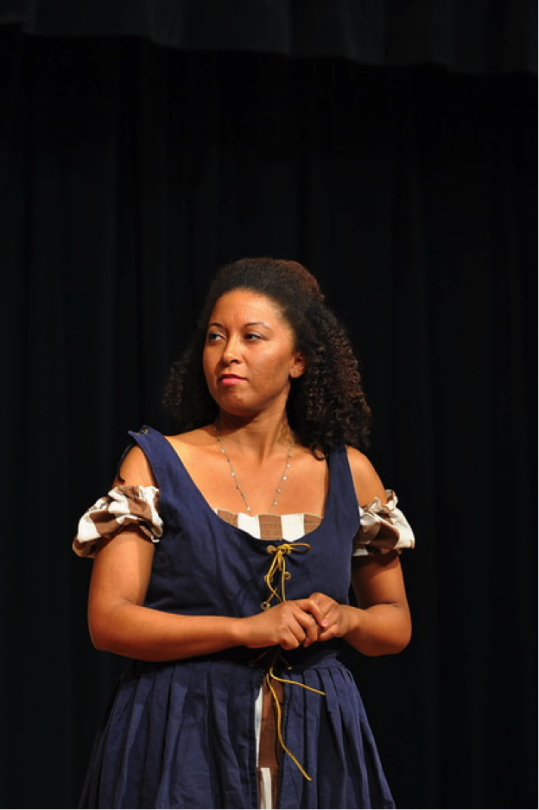
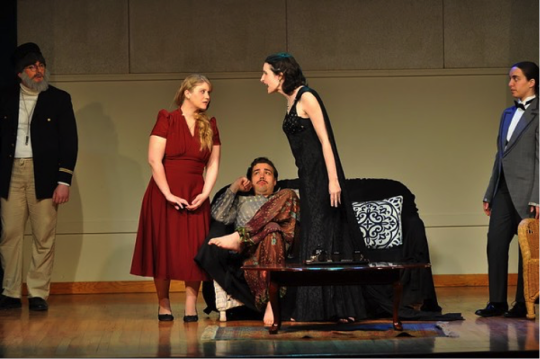
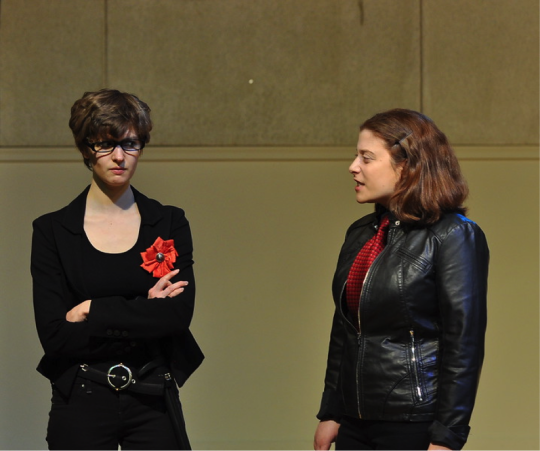
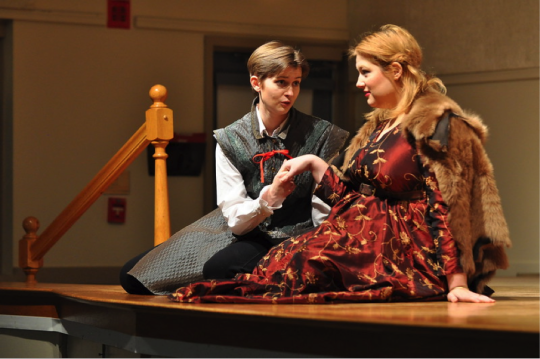
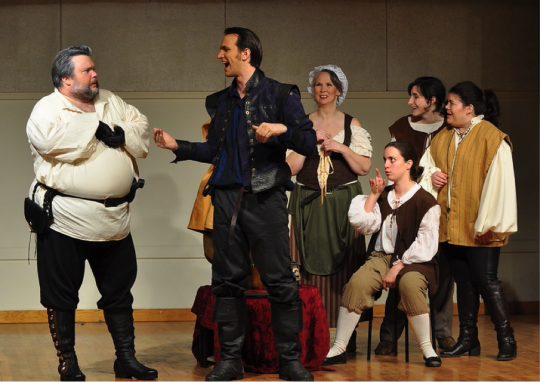
Sarah Brosenstern interviews Arielle Seidman, Artistic Director for Britches and Hose, a gender-blind theatre group in Northern Virginia, U.S.A.
With today’s ease of streaming video to cell phones, computers, and home televisions in a matter of seconds, it is a sad reality that many young people today have a limited exposure to live theatre. Yet there are many community theatre groups out there who seek to make live theatre more accessible to their local communities. Recently, I touched base with Arielle Seidman, a longtime friend and the Artistic Director for Britches and Hose, an American gender-blind theatre group whose actors hail from Washington, D.C. and the nearby states of Virginia and Maryland.
Tell me a bit about Britches and Hose. What prompted you to start this troupe?
Britches and Hose is a gender-blind theatre company in Fairfax, Virginia. We founded the company in 2010, only a few months after I graduated from Bryn Mawr College in Philadelphia. Bryn Mawr had (and still has as a matter of fact) a student performance company called the Shakespeare Performance Troupe, or SPT, which was one of the most body-positive, open, welcoming theatrical groups I'd ever been involved with. As the name implies, SPT focused primarily on Shakespeare plays as they were free and easy to produce on a low budget. My idea, when I began Britches and Hose, was to create a company sort of like SPT, where the company was welcoming and inclusive, the productions were focused on character more than spectacle, and which provided a wealth of rewarding theatrical community to everyone involved.
Originally the troupe started as an all-female organization. There are now male actors in the troupe, but the troupe has remained committed to gender-blind casting. Why is gender-blind casting important (particularly for women), and what does this offer the arts community?
We at Britches and Hose are committed to gender-blind casting because it opens doors to everyone. We allow skill, talent, reliability and dedication to dictate which roles a person receives, not gender or gender presentation. One of the best Juliets I've ever seen was played by a man, and absolutely my favorite Richard III of all time was played by a woman. Acting is about stepping out of yourself and embodying someone else, and I don't think you should be limited only to the roles that are traditionally assigned to people of your biological sex. For women, specifically, this means far more acting opportunities, and thus more opportunities for growth as a performer. Last year, I was given the chance to play Brutus from Shakespeare's Julius Caesar, and that was probably the most challenging role I've ever taken on. I learned a lot about myself as an actor and I developed new ideas and techniques about the theatre just from working my way through the performance of that role, but that role, a tragic protagonist, is almost always reserved for men. Women, too, need opportunities to play life's heroes and villains. How often have you, Sarah, seen a play and said, "Wow, I absolutely LOVE that role, but I could never play it because that's a male role?" Britches and Hose doesn't believe that problem has to exist.
Why do you think community theatre often doesn't engage in gender-blind casting? Do you see any hope for increasing this practice?
There are some other local groups that do gender-blind casting, but it's not common. You see it more often in companies that do Shakespeare plays, and the other day I saw that a group in Loudon was auditioning for a production of Moliere's Scapin, with some roles cast gender-blind. I think most people cast traditionally, according to gender, because it's easier and more obvious. I think it honestly doesn't occur to some people that one could even cast a man in a female role, or a woman in a male role. Other people assume that a woman playing a male role or a man playing a female role won't be convincing enough to pull off the character. I've heard people say things like “Men playing women's roles or women playing men's roles is very often distracting and ridiculous." It's a terrible shame, really, because I think Britches and Hose has disproved that particular remark time and time again.
What genre does the Britches and Hose troupe typically focus on for its productions? Also, I hear you do some creative writing independently of the troupe. Are there any plans for the troupe to perform pieces that are written by Britches and Hose members?
We typically perform either plays available in the public domain, such as Shakespeare and Oscar Wilde, or original works written by company members or local playwrights. Our New Works Festival of entirely original one-act plays is coming up in a few months! I was actually hoping you'd audition for that, Sarah. I mean, you know, no pressure. As to whether or not we'll be performing any of my original work, that'll depend on whether or not I can come with anything that impresses the board before the submission deadline passes... Stay tuned!
What would you say are the biggest challenges that the troupe has had to address since its founding?
Oh my goodness, isn't this a question. What are the biggest challenges we've faced? Well, honestly, I think they've been primarily financial. Theatre is an expensive prospect, and we've struggled a few times to find suitable venues for our productions, venues within our price range. We've also had some disastrous run-ins with the weather, and I think there have been three shows over the course of the last five years that have gotten either snowed out or have had attendance significantly diminished by major storms. I will say that our membership, a very talented, very resilient, very dedicated group of performers and technicians does significantly mitigate those challenges. We may not have any control over the price of performance space, or over the weather, but our people are remarkable for their attitude and their follow-through, and that helps us get through the worst of times.
What are your hopes for actors working with Britches and Hose? What do you hope they take away from the experience of working with the troupe?
I would like not only the actors, but also the techies and anyone involved with Britches and Hose to feel safe taking risks, making mistakes, having adventures, and to feel like part of a theatrical community, even a family. Britches and Hose is a place to take advantage of opportunities, to grow as performers and as people, and to maybe to find your theatrical niche. I also feel strongly that the Britches and Hose are all team players; I say it a lot, but theatre is a team sport. Not only do you need to look and sound good onstage, but your goal should be to make everyone else onstage look, feel, and perform better as well.
What advice would you offer for someone who is new to theatre or who is interested in starting their own theatre company?
If you're thinking about getting involved with the theatre, go for it. We'd love to have you, and it's a wonderful form of expression, a social opportunity...there are a hundred wonderful things about the theatre. If you're planning on starting a theatre company, start playing the lottery, regularly, now. Also, and I mean this in all seriousness, pick yourself a good team. Don't try to do everything by yourself; it's essentially impossible. Find some people you trust, competent people, people who have the same vision as you do for where they want the company to go, and form yourself a team, because you will succeed a lot faster that way, and your product will be a better, longer-lasting one. This is, by the way, a shout-out to Leandra Lynn and Dan Clark, the Managing and Technical directors of the Britches and Hose Shakespeare Company.
[Sarah Brosenstern]
All photos courtesy of Britches and Hose. Sarah Brosenstern is an American writer on social issues in the Washington, D.C. and Baltimore, Maryland area. For more of Sarah’s work, visit her website.
#sarah brosenstern#tyci#feminist#feminism#gender blind theater#theatre#theater#shakespare#art#britches and hose#leandra lynn#dan clark#Arielle Seidman
0 notes